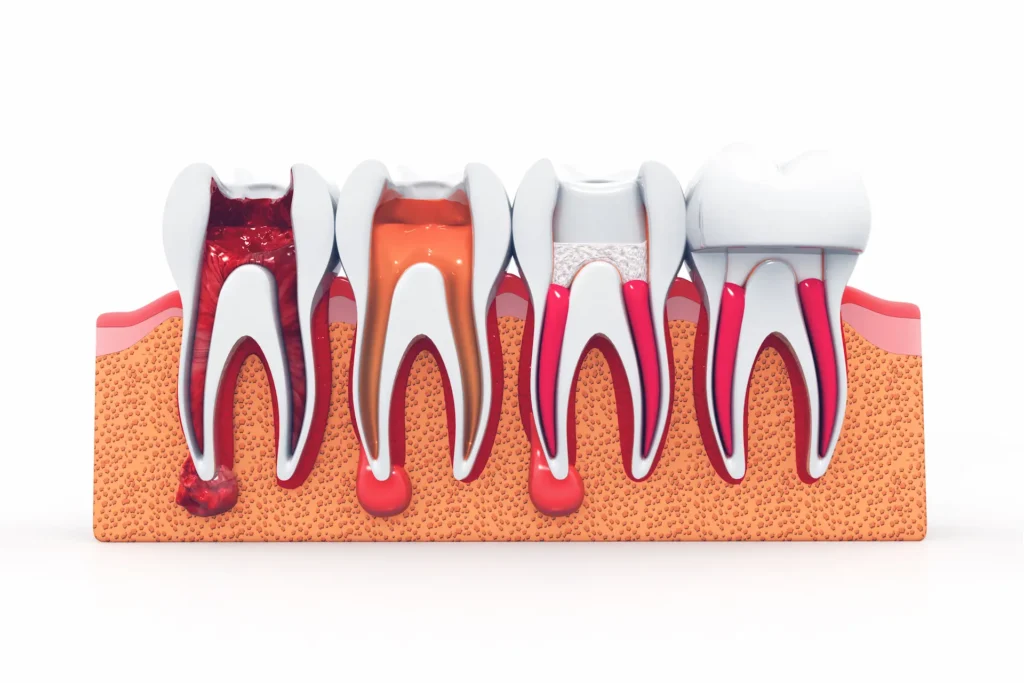There comes a time when a tooth suffers severe damage or disease, leaving you with a conundrum of treatment options to discuss with your dentist. Among these options are a root canal, an extraction, or the possibility of a dental implant—an artificial tooth designed to replace your missing tooth.
Timely decision-making is crucial when it comes to dental issues. You must carefully consider the costs and benefits in collaboration with your dentist to determine the best course of action. Each treatment presents its own set of advantages and disadvantages.
Dental implants involve the replacement of a missing tooth with an artificial one, while root canals aim to salvage and restore a damaged natural tooth.
Through this article, we will undertake a comprehensive comparison of these two treatments, providing valuable insights to assist you in making an informed decision that best suits your dental needs.
Key Takeaways
- Root canals may save damaged teeth by removing the infected tooth root but many root canals fail after many years. Dental implants replace damaged or missing teeth with durable, natural-looking alternatives.
- Root canals are less invasive and cost-effective but may require additional care over time.
- Dental implants prevent bone loss and last much longer. They work by removing the potential of re-infection and replacing the missing roots, ensuring the jawbone’s health and integrity is maintained.
- Book a cost-free consultation with Nuset Dental Implants today to explore the best solution for your smile!
Dental Implants vs. Root Canals: Let’s Break it Down
When considering treatments for dental health, it’s essential to understand the differences between implants and root canals.
Dental implants are a solution for missing teeth, involving the insertion of a titanium post into the jawbone and attaching a crown.
Root canals, in contrast, aim to save a damaged tooth by removing infected areas and then filling and sealing them.
The choice between these treatments hinges on preserving tooth structure, aesthetics, longevity, oral health impact, and cost.
Here’s a table depicting the key difference between a root canal and dental implants:
| Factors | Dental implants | Root canals |
|---|---|---|
| Effectiveness in Preserving Tooth Structure | Not applicable (replaces missing tooth) | High (aims to save natural tooth) |
| Aesthetics and Natural Appearance | Mimics natural teeth closely | Retains natural tooth, appearance varies |
| Longevity and Durability | Long-lasting (decades with proper care) | Varies; can be long-lasting with proper maintenance |
| Oral Health Impact | Prevents jawbone loss, doesn’t affect adjacent teeth | Maintains natural tooth, less impact on surrounding teeth |
| Cost | Generally higher initial cost | Usually less expensive than implants |
What is a Root Canal?
A root canal is a dental procedure designed to save a tooth that is badly decayed or infected. During this treatment, the dentist removes the damaged area of the tooth (usually the pulp), cleans and disinfects it, then fills and seals it.

The primary goal of a root canal is to preserve the natural tooth and avoid extraction. Root canals are known for their high success rate of 97% and can significantly prolong the life of a tooth. The process not only eliminates tooth pain but also prevents the spread of infection to other teeth.
Pros of a root canal
- Preserves the natural tooth, maintaining the original structure.
- Typically, it is less expensive than a dental implant.
- Less invasive procedure, focusing on the inside of the tooth.
Cons of a root canal
- The treated tooth may become brittle and prone to fracture over time.
- There’s a possibility of needing repeat treatment in the future.
What are Dental Implants?
Dental implants are a treatment for replacing missing teeth. This procedure involves inserting a titanium post into the jawbone, which acts as a substitute for the tooth root. Once the post is in place and the jawbone has healed around it, a crown is attached to mimic the missing tooth.

Dental implants provide a stable and durable solution, effectively restoring the function and appearance of natural teeth. They are known for their high success rates of 98% and offer a long-term solution for tooth replacement.
Pros
- Offers a natural-looking and feeling replacement for missing teeth.
- Prevents bone loss in the jaw, maintaining facial structure.
- High long-term success rate, often lasting for decades.
Cons
- Usually more costly than a root canal.
- More invasive, requiring minor oral surgery.
- Needs sufficient bone density for implant placement.
Cost of Root Canal and Dental Implants
The cost of a root canal and dental implant can vary widely. Generally, root canals are less expensive than dental implants. The cost of a root canal depends on the complexity of the procedure and the tooth’s location, and it costs between $600-$1,100, usually more affordable than an implant.
On the other hand, dental implants involve a higher initial cost due to the materials used and the surgical procedure required. Dental implants typically range from $1500-6000 per tooth.
For specific pricing, especially for dental implants, it’s advisable to refer to our carefully curated resources on the website.
Time Frame of Root Canal and Dental Implants
The time frame for a root canal procedure and a dental implant differs significantly due to the nature of each treatment. A root canal usually requires one to two visits over a couple of weeks. The process is faster as it involves treating and preserving the existing tooth structure. After the procedure, the tooth is restored and can function normally quite soon.
Dental implants, on the other hand, involve a longer time frame. This procedure begins with placing a titanium post in the jawbone, which must integrate with the bone, a process that can take several months.
After this healing period, the artificial tooth (crown) is placed on the implant. While the overall process is longer, advancements such as one-day implants or immediate load implants have made it possible to shorten the duration. Depending on their dental and bone health, these options provide quicker results but may not be suitable for all patients.
In both cases, the specific time frame can vary based on individual circumstances, such as the patient’s oral health, the complexity of the case, and the patient’s healing process.
Level of Invasiveness
The level of invasiveness between root canal and dental implant procedures is quite distinct. A root canal is considered less invasive. It involves removing the nerve and pulp inside the tooth, cleaning the space, and then sealing it. This procedure focuses on treating the internal part of the tooth and doesn’t involve surgery on the bone or gums.
Dental implants require minor oral surgery to place a titanium post into the jawbone. This step is crucial as it provides a stable foundation for the new artificial tooth. The procedure involves a small incision in the gum and drilling into the jawbone, which is more complex than the internal work done in a root canal.
Saving the Tooth vs Extraction and Implant
Deciding between a root canal and an extraction followed by an implant depends on the tooth’s condition and individual circumstances. A root canal is preferred when the natural tooth can be saved. It involves removing the infected pulp and sealing the tooth, which preserves the tooth’s integrity and avoids the need for more invasive procedures.
However, an extraction and dental implant may be necessary if the tooth is extensively damaged or decayed. Dental implants replace the missing tooth and provide stability and functionality similar to a natural tooth. They involve placing a titanium post in the jawbone, which requires a surgical procedure and a healing period. In cases where a tooth has been missing for an extended period, a bone graft may be needed to ensure the jawbone can support the implant.
This decision should be made in consultation with a dental professional who can assess the tooth’s specific condition and the patient’s overall oral health. Each option has its advantages and considerations, and the best choice depends on the patient’s dental health, personal preferences, and long-term oral health goals.
Potential Risks of Root Canal vs Extraction and Implant
Every dental procedure has potential risks, and it’s important to be aware of these when considering a root canal or a dental implant.
Risks of Root Canal
- The tooth may become re-infected even after treatment.
- The treated tooth can become brittle and might crack.
- Sometimes, a root canal may need to be redone to fully clear the infection or due to structural issues.
Risks of Extraction and Implant
- There’s a risk of infection at the implant site.
- The surgery could potentially cause damage to nerves in the mouth.
- The implant may not integrate properly with the jawbone, requiring further surgery.
Both procedures are generally safe, but like any medical treatment, they come with certain risks. Discussing these with a dental professional is vital to fully understand your specific situation.
Making an Informed Decision
To make a well-informed decision between a root canal and a dental implant, consider these additional steps:
- Look into reliable sources for information on both procedures.
- Prepare a list of questions to ask during your dental consultation.
- Book a detailed consultation with a dentist or endodontist specializing in these treatments.
- Reflect on what matters most to you in terms of dental health and aesthetics.
- Ask yourself the following questions: Do you prioritize natural tooth preservation, or are you looking for a more permanent solution?
- Talk with family or friends who have undergone similar procedures, as they can offer practical insights and personal experiences.
These steps will give you a comprehensive understanding of each option and equip you with the knowledge to choose the best solution for your dental health.
Get Expert Solutions to Your Dental Needs at Nuset Today!
Nuset Dental Implants and Oral Surgery specializes in providing top-notch dental implant and root canal treatments. We employ cutting-edge technology and advanced techniques to ensure the highest quality of care.
Our team of experts is well-equipped to handle a wide range of dental issues, offering personalized solutions tailored to each patient’s needs. If you’re considering dental implants or root canal treatment, Nuset represents a reliable option for professional and comprehensive dental care. Book a free consultation with us today to get started.
Frequently Asked Questions
Which is a better option, a root canal or an implant?
Choosing between a root canal and an implant is subjective and depends on various factors. A root canal is typically used to save a natural tooth that is decayed or infected, while an implant replaces a missing or extensively damaged tooth. The decision should be based on the tooth’s condition, cost, personal preferences, and advice from a dental professional.
Should I save my tooth or get an implant?
If your tooth can be saved and restored effectively with a root canal, preserving the natural tooth is usually preferable. However, if the tooth is beyond repair or if saving it may cause more dental issues in the future, an implant might be recommended.
What hurts more, a dental implant or a root canal?
Both procedures are performed under anesthesia to minimize pain. The level of discomfort post-procedure varies from person to person but is generally manageable with medication. Root canals tend to have a quicker recovery, while implants might involve more discomfort due to the surgical nature of the procedure.
Can you save a tooth with a root canal?
Yes, a root canal is intended to save a tooth at risk of being lost due to infection or decay. The procedure involves removing the infected pulp, cleaning, disinfecting, and then sealing the tooth. If successful, it can preserve the tooth for many years.
What dental implant services do you offer?
At NuSet Dental Implants and Oral Surgery, we offer various dental implant services to meet diverse needs and preferences. Each service is tailored to best fit your specific dental situation.
Here’s a look at the various implant services we offer:
- Full mouth dental implants
- All-on-4 Dental Implants
- All-on-5 Dental Implants
- All-on-6 Dental Implants
- All-on-8 Dental Implants
- Snap-On Dental Implants
- Mini Implants
- Zirconia Implants
- Single Arch Implants
- Full Arch Implant Supported Bridge
- Zygomatic Dental Implants
- Same Day Dental Implants
Where can I get dental implants near me?
If you’re searching for “dental implants near me,” NuSet Dental Implants and Oral Surgery has several convenient locations to serve you. Each office is equipped with state-of-the-art technology and staffed by experienced professionals dedicated to providing top-quality dental care.
- NuSet Dental Implants and Oral Surgery of St Louis
- 2821 North Ballas Road #225 St Louis, MO 63131 (Inside Town and Medical Building)
- Get driving directions
- NuSet Dental Implants and Oral Surgery of Scottsdale
- 8800 E. Raintree Dr Suite 170 Scottsdale, AZ 85260
- Get driving directions
- NuSet Dental Implants and Oral Surgery of Nashville
- 5651 Frist Blvd. #300 Hermitage, TN 37076
- Get driving directions
- NuSet Dental Implants and Oral Surgery of Clarksville
- 12431 Clarksville Pike Route 108 Clarksville, MD 21029
- Get driving directions
For personalized care and the highest standard in dental implant services, visit one of our locations. Schedule your appointment today and take the first step towards a healthier, more confident smile.





